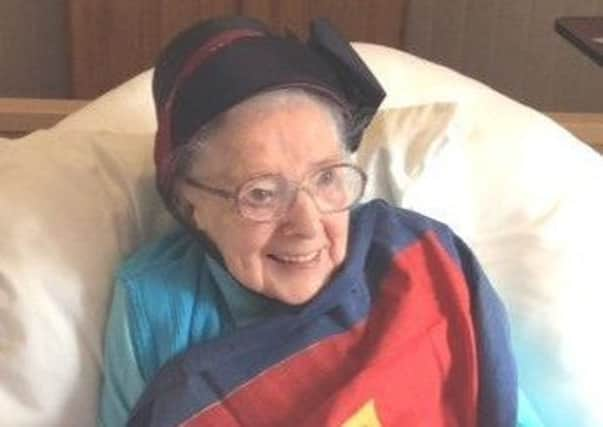Obituary: Janet Fraser, Scottish Salvation Army brigadier


The Lusitania had just been sunk with the loss of almost 2000 lives and the first zeppelin raid on London was just days away.
Into this turmoil of a world shattered by the Great War arrived Jeannie Fraser, born into a Salvationist family in Aberdeen in the shadow of the city’s Pittodrie football stadium.
Advertisement
Hide AdAdvertisement
Hide AdOne of five children, she was dedicated at Aberdeen Citadel, at the foot of the city’s famous Granite Mile, where she began a Salvation Army life which would span more than 90 years.
The young Jeannie, known as Janet, moved south in 1920, at the age of five, to the Angus fishing town of Arbroath where the family lived in a modest cottage with no running water and an outside toilet. “My parents had to work hard to keep a roof over our head. No wall-to-wall carpets but we had wall-to-wall love,” she remembered fondly.
There they become immersed in the Arbroath Salvation Army Corps and, having been taught the accordion by her father, Janet would regularly play at open air meetings, morning and night.
“I gave my heart to Jesus when I was eight-years-old and became a junior soldier,” she recalled. Later she was commissioned as Young People’s Sergeant Major, a post as a leader of the Corps’ children’s programme, which could involve overseeing a Sunday School class of as many as 100 youngsters.
She was 20 when she began her training 500 miles away in London, a bittersweet experience that was seared in her memory: “It was a proud day for me when I stitched my acceptance star on my sleeve and was accepted for the Salvation Army Training College in Denmark Hill in 1935. On my first day I wept the whole day – I was so homesick.”
However, Janet soon overcame her melancholy and embraced college life, loving every minute of her training. She was made Colour Sergeant of her brigade and delighted in marching with the cadet bands amid fluttering flags as they made their way to Sunday meetings.
Commissioned from the Royal Albert Hall in May 1936, as a probationary lieutenant, her first appointment was to Strawberry Field, the Salvation Army children’s home in Woolton, Liverpool, that was to inspire John Lennon’s song Strawberry Fields Forever. Lennon lived close to the home and, as a child, would jump over the wall into the grounds to play and listen to the Salvation Army band. The song, released in 1967, remains one of the Beatles’ masterpieces.
But in 1939 the world found itself at war for a second time in a generation and Janet was appointed to an old people’s home in London, where she served during the Blitz, habitually going to bed fully dressed so she would instantly be ready to look after the elderly residents should the air raid siren sound. As they took cover in the shelters, waiting for the bombers to finish their deadly missions, she would keep them entertained, playing her concertina, leading the singing and distributing food and drink.
Advertisement
Hide AdAdvertisement
Hide AdImbued with both a genuine great love of people and a keen sense of humour, reminiscing on her 100th birthday she recalled: “The ladies put their teeth in dishes at night so when we took them down to the shelter one day one lady said, ‘I could eat my bread if I had some teeth’, so I dashed upstairs and grabbed what I thought might be her teeth. Anyway, they seemed to fit and all was well.”
During one air attack Janet had an incredibly lucky scrape when an explosion catapulted a large glass windowpane on top of her. Matter-of-factly she described thinking she had been killed. “I said to myself, ‘I am dead’ while lying there, but realised I was very much alive and so went on my way to see the old folk.”
Having survived the onslaught on London, after the war she was sent to a Salvation Army Children’s home in Southport for youngsters from bomb-ravaged cities. Her passion for social work continued when she was appointed to Hope House in Glasgow, a former 19th-century police barracks on the banks of the River Clyde that the Salvation Army had turned into a large hostel for women. There she provided pastoral support for accused persons appearing in court and built up such a rapport with the residents that they would regularly ask for a serving of “Saviour Pie” when the hot meals were dished out along with tales of Jesus.
From Hope House she moved to Marthara House, a children’s home in India Street in Glasgow’s Charing Cross, before her final appointment at a girls’ residence in Edinburgh.
An evangelist all her life, she never fully retired, remaining an active member of the Arbroath Corps for many years, holding the post of treasurer for more than a decade and selling the War Cry as part of her street ministry.
During her long life of service Janet had inevitably seen many changes but would always stand up for her beloved Salvation Army, sometimes forcefully if she disagreed with changes – notably over the style of uniform, particularly the bonnet which was designed by the wife of founder General William Booth but which has been replaced by a softer hat.
Janet had protested to the Salvation Army leader and just last year declared: “My bonnet is precious: it was an outstanding part of the uniform, I was very clear in my letter to say that I would be wearing my bonnet until it was replaced by a Crown of Glory!”
ALISON SHAW